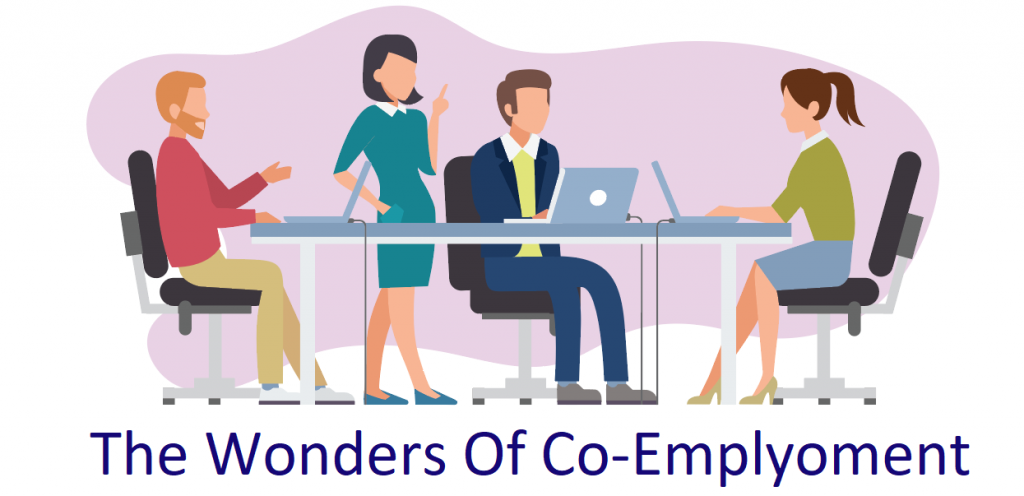Imagine employees in your company can ditch rout administrative tasks and replace the time spent innovating, getting closer to your customers, or cultivating their skill sets. With that heightened focus on your business, what kind of new competitive edge could your organization achieve?
It’s tantalizing to think about, right? And the good news is, the ability to streamline your business and leverage expertise where it really counts – in your people – is a possibility for companies of any size. Organizations invest massive sums of money and time in people management: recruiting, HR tasks, and payroll all incur organizational costs. To free up resources to focus on competing, many organizations have turned to co-employment to offset employer responsibilities, costs, and risks by partnering with another organization to take this on.
How Does Co-Employment Work?
In a co-employment arrangement, a business shares employment responsibilities with a professional employment organization (PEO), enabling the business to offload its HR obligations to the PEO while still providing complete control over daily responsibilities and core job functions.
Co-employment enables organizations with limited resources to offset their risk and overhead while allowing them to onboard top talent. This option is particularly advantageous for organizations looking to up their technology edge, as this specialized workforce requires additional skill to recruit, onboard, and retain.
From the smallest startups to the largest-scale Enterprises, developing world-class software solutions depends on world-class IT talent. But not all organizations have the IT resources in-house to provide the software development services, quality assurance, and testing required to remain on the cutting edge. Enter IT team augmentation, or co-employment, where suddenly the playing field is a lot more level, regardless of existing IT resources and talent.
Under this model, your business is responsible for two areas:
1. Assigning daily tasks for employees
2. Keeping the staffing company appraised of any performance management issues
On the other hand, the agency is responsible for:
1. Payroll
2. Employer taxes and tax forms
3. Unemployment claims and worker’s compensation
4. Onboarding
5. Hiring and firing employees
6. Providing performance reviews
Global Software Development: Making Co-Employment Work for You
When structured correctly, co-employment can benefit everyone involved. Businesses can focus on their core competencies to boost their competitive edge, while employees can enjoy all the excitement of working at a start-up with the advantages that accompany a larger organization.
Co-working employees benefit from:
• Premium benefits and benefits options PEO’s are able to provide (which are typically much richer than a smaller-scale business can afford).
• More robust training offered by PEOs
• Professional employee handbooks and internal communications
Businesses partnered in a co-employment agreement benefit from:
• Premiere benefits packages, because better benefits often mean better ability to recruit top talent.
• The ability to offload wage and employment tax responsibilities
• Additional support with worker’s compensation coverage and related claims management
• Freeing time and resources as they can pass along the reporting, collection, and deposing taxes with state and federal agencies.
• HR departments can also receive a boost from the PEO’s expertise.
• Stronger IT talent which makes technology advancement possible across a myriad of areas: IT project management, software development services, quality assurance and testing, web development, and mobile app development, to name just a few.
• Better training programs
• Recruiting support
• Reduced employee turnover
• Greater flexibility through an on-demand workforce, which can be staffed up or down to meet current business needs.
Co-Employment Gone Wrong: A Case Study
Opponents of co-employment may be quick to point the landmark Microsoft case of 2000, in which the tech giant agreed to pay $97 million to settle a class-action lawsuit accusing the company of denying benefits to temporary employees. In the case of Microsoft, many of these employees had worked for longer than two years as “temporary” employees, missing out on health benefits, stock options, and pensions.
Since then, the company has streamlined its policies to provide better distinction between temporary and permanent employees, striving to close a risk gap when employment and terms are ill-defined.
Partnership Over Provider
To avoid co-working pitfalls, a quality co-working partner ensures the relationship is clear upfront and is willing to manage five key areas, which if left undefined, can create gaps and risks for the businesses in the partnership. These areas are:
1. Compensation discussions
2. Hiring
3. Payroll
4. Addressing behavior issues
5. Keeping employees informed
And really, a good co-working relationship comes down to finding a trusted partner to build your business alongside you and invest in the people who power that business.
Learn what makes TechGenies a global software co-employment company – and not just another outsourcing organization – and how we can build the right, flexible workforce solutions to meet your needs now, and as you grow.
Fill out the form and our team will be in touch with you promptly. Thank you for your interest!
info@techgenies.com
www.techgenies.com


